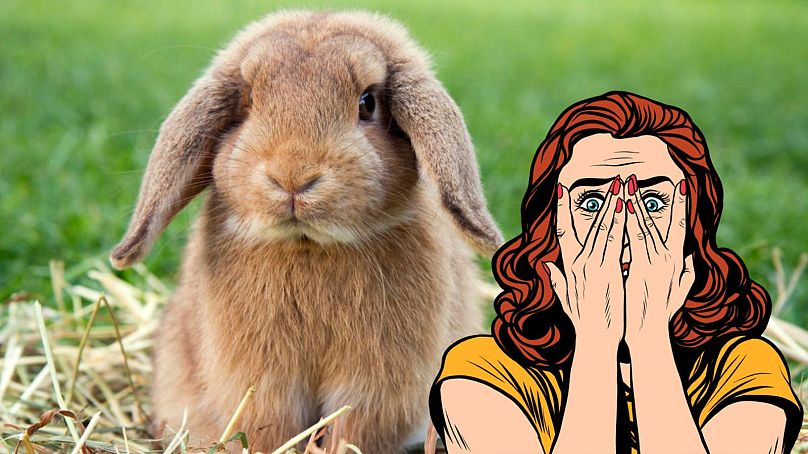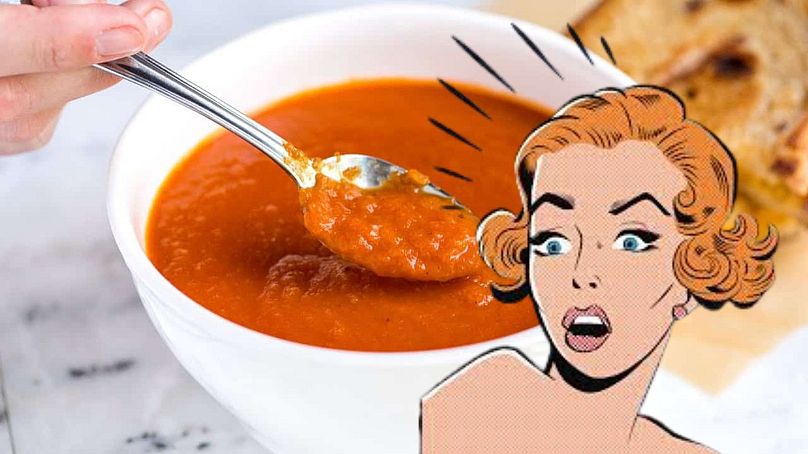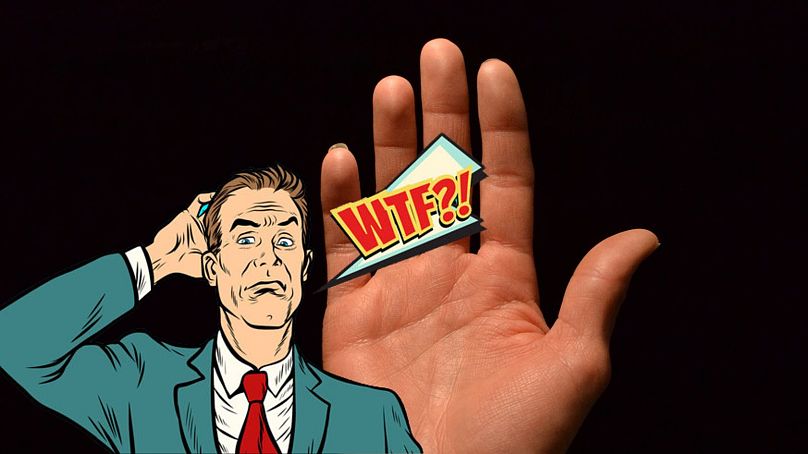There's a WHAT in my soup?? In honour of Francophone Week, here are perfect French expressions that will give English-speakers a headache
France is going through the motions at the moment.
Protests and repeated strikes because of President Macron’s recent pension reform have been grinding the country to a halt. Even the royal visit from King Charles this Sunday, which would normally have been a cause for celebration, has been cancelled.
Aside from their crushing victory against England during the Six Nations rugby earlier this month, it feels like the country has little to cheer for of late. But it may have escaped you that this week was La Semaine de la Langue Française et de la Francophonie - French Language and Francophone Week.
So, what better time to celebrate the French language, and dwell on some expressions that sound nonsensical to foreign ears. After all, try getting your head around conversations about breaking three legs on a duck, having your arse lined with noodles whilst being on your 31…
Confused? We've got you covered. Here are some of Euronews Culture’s favourite common French idioms that may baffle English speakers and which definitely speak to the language’s rich history and humour.
“Tomber dans les pommes”
Literal translation: To fall in the apples.
Meaning: To faint. When the French pass out, they lose consciousness in fruit.
Origin: The expression apparently first appeared in a letter sent by French novelist George Sand to her friend Madama Dupin in the 19th century. However, it actually goes back to a linguistic deformation, an expression which derives from the medieval expression “Tomber dans les pâmes” – the old French “se pâmer” meaning to faint.
"Ça ne casse pas trois pattes à un canard"
Literal translation: It doesn’t break three legs on a duck.
Meaning: It’s nothing spectacular / it’s banal. Nothing about harming waterfowl. The closest equivalent in English would be the expression “It’s nothing to write home about”, or the Spanish “No es ninguna cosa del otro jueves” (“It’s nothing new than last Thursday”.)
Origin: Unknown. Ducks only have two legs, so this one is nuts. Visually satisfying, but nuts. Essentially, if you find a third leg to break, you've really done something extraordinary.
“Poser un lapin”
Literal translation: To place a rabbit.
Meaning: To stand someone up. So, if your date doesn’t show up, you can say “il / elle m’a posé un lapin.”
Origin: The expression dates back to the 19th century, and it originally meant “not to repay a woman’s favours”. Later on, Lorédan Larchey in his 'Nouveau supplément du dictionnaire d’argot' indicated that the bunny is used to allude to “the rabbit placed on the turnstiles of the fairground games, which seems easy to win and which one never wins".
"On n’est pas sorti de l’auberge"
Literal translation: We’re not out of the inn.
Meaning: To face a complicated problem that’s far from being over. While the British would not be out of the woods and the Germans are not out of the penalty zone, French problems detain you in the local hostel.
Origin: Many believe that the expression refers back to Balzac and the sordid boarding school Vauquer, or even Maupassant’s nightmarish Auberge. However, the origin is much simpler, going back to the term "auberge", which used to refer to a prison - a place where, like an inn, the imprisoned are offered room and board.
"Avoir le cul bordé de nouilles"
Literal translation: To have your arse lined with noodles.
Meaning: To be lucky. (And a dry-cleaning nightmare)
Origin: The expression “Avoir du cul" - "to have arse” also works in French, but the noodle part is believed to be another reference to prison. Without trying to be too graphic, power dynamics are prelavent in prison. Inmates who agree to engage in homosexual relations derive many advantages - such as protection and privileges. The noodle part comes in because haemorrhoids, when looked at closely and despite their colour, can be compared to noodles.
“Être sur son 31”
Literal translation: To be on your 31.
Meaning: To be well dressed and wearing elegant clothes. Think Cannes Festival Red Carpet events.
Origin: The ‘31’ possibly derives from the word "trentain", once used to describe luxury fabrics. But the accepted origin heralds from Prussia, where soldiers were visited by their military hierarchy every 31st of the month. For the occasion, the soldiers had to clean their barracks from top to bottom and dress to look their best.
"Il y a une couille dans le potage"
Literal translation: There’s a bollock in the soup.
Meaning: Something’s gone wrong somewhere. (And keep your genitals out of my broth.)
Origin: Colourful one, this one. Once you’ve finished chuckling at the palaver brought about by such a situation, take into consideration that the origin is far less risqué. The expression comes from the Vendée region in France where the “touille” is a soup spoon only used to stir the bisque. Good manners state that you should remove the “touille” (which turns to ‘testicle’ with a mere switch of the first letter) from the soup before serving. So it’s all about table etiquette, which some filthy-minded bunch decided to make far more vivid. For shame!
“J’ai le cafard”
Literal translation: I’ve got the cockroach.
Meaning: To be depressed. The French don’t like cockroaches. But then again, who is cheered up at the sight of one?
Origin: In the sixteenth century, the French word "cafard" (which comes from the Arabic "kafir", meaning "miscreant") referred to a person who was not very religious and who made others believe that he or she was deeply religious. A deceiving devotee, basically. It also refers to a person who denounces others and snitches. So nothing good. Then came poet Charles Baudelaire, who introduced a cockroach in 'Les Fleurs du Mal' in 1857. Speaking of the Devil, he wrote:
"Parfois il prend, sachant mon grand amour de l'Art,
La forme de la plus séduisante des femmes,
Et, sous de spécieux prétextes de cafard,
Accoutume ma lèvre à des philtres infâmes."
English translation:
"Sometimes he takes, knowing my great love of Art,
The form of the most seductive of women,
And, under specious pretences of cockroach,
Accustoms my lip to infamous potions."
“Avoir un poil dans la main"
Literal translation: To have a hair in your hand.
Meaning: To be lazy. The expression is usually reserved for someone who avoids work at all costs.
Origin: The expression dates back to the early 19th century and its origins are not known. You’ll just have to be content with the image of a person so lazy and inactive that they've let a hair grow out of their palm.
“Tu me cours sur le haricot”
Literal translation: You’re running on my bean.
Meaning: You’re getting on my nerves. The French prefer veg for this, while the Germans favour biscuits (“auf den Keks gehen” – “to tread on the biscuit”) the British edge toward nipples (“to get on someone’s tits”) and the Spanish go back to testicles (“tocar los huevos / cojones” – “touching the balls”).
Origin: The link between bean and exasperation isn’t immediately obvious, especially if the story of Jack and the Beanstalk is to be believed, as all you need is a giant bean to run on. The French expression is an odd mixture of various origins: the verb "courir" in French meant "to bother" in the 16th century, and the verb "haricoter" meant "to be petty in business" at the beginning of the 19th century.








